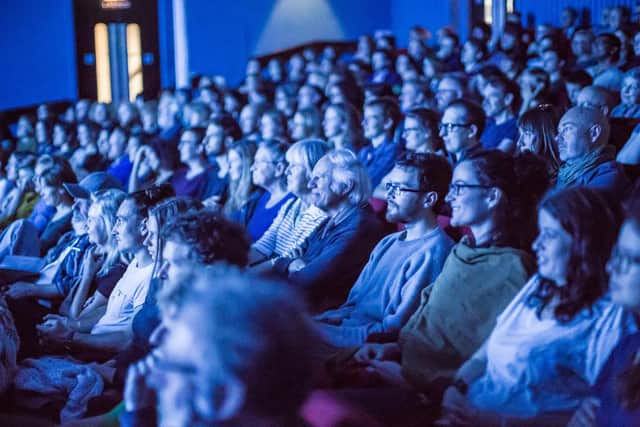Accounts reveal six years of ‘major risk’ concerns over Filmhouse and Edinburgh International Film Festival
and live on Freeview channel 276
Concerns were raised by the Centre for the Moving Image's (CMI) board about its reliance on public funding, the loss-making performance of the film festival and the "inadequacy" of the Filmhouse building in Edinburgh’s cultural quarter as far back as 2016.
A failure to secure new releases was also regularly cited as a growing problem for the Filmhouse cinemas in Edinburgh and Aberdeen, which were both run by the CMI.
Advertisement
Hide AdAdvertisement
Hide AdLosses of more than a quarter of a million pounds were recorded in the two years before the Covid pandemic struck, while the film festival was also said to have recorded box office losses in 2018 and 2019.


The CMI subsequently received more than £5.3 million in public money, including £1.3m in Covid recovery funding and extra ‘resilience’ help to the tune of £270,00 to stage the festival’s 75th-anniversary addition this year.
When the CMI’s board of trustees confirmed earlier this month that administrators had been called in, they blamed a “perfect storm” of external factors for the move, which led to the sudden closure of the film festival and the Filmhouse cinemas in Edinburgh and Aberdeen.
These included rising energy bills, inflation, the impact of the cost-of-living crisis on ticket sales and the “lasting impacts” of the pandemic on consumer behaviour.
Advertisement
Hide AdAdvertisement
Hide AdHowever, the CMI’s accounts reveal long-standing concerns about its financial outlook well before the pandemic.


The Filmhouse building was first identified as a “major risk” to the future of the arts charity in the 2016 accounts, when it was branded “not adequate for the long-term financial health of the organisation”, due to its limited development potential and the resources needed to “maintain it at a basic level”.
The possibility of a reduction in public funding was also raised as a “major risk” in the same year’s accounts.
Problems were mounting by 2019, as the CMI’s increasingly struggled to secure new films on release and “unusually warm weather” was cited for poor audiences in the accounts, which reported a £72,000 loss for the festival and an overall loss of £261,953.
Advertisement
Hide AdAdvertisement
Hide AdA “poor box office” return for the film festival was recorded in the accounts for the 2019 event, the last under artistic director Mark Adams, whose departure was announced in November 2019.


At the time Mr Adams said he had decided "it is time to move on” and was praised by the CMI’s chief executive Ken Hay and its board.
However, that year’s festival was said to have made a loss of £74,000, with the CMI reporting an overall loss on unrestricted funds of nearly £300,000.
The accounts reveal the CMI board had decided to prioritise a new home for the Filmhouse and film festival by 2019.
Advertisement
Hide AdAdvertisement
Hide AdA “bold new vision” for a multi-storey building in Festival Square, opposite the Usher Hall, was unveiled in March 2020.


At the time, Mr Hay said: “This proposed new building will transform what we’re able to do for Edinburgh’s residents and Scotland’s film community, as well as providing Scotland with a physical celebration of the most popular artform.
"Through doubling the number of screens and seats for regular cinema-goers, creating dedicated education and learning spaces, and developing an iconic festival centre, all within a fully accessible and carbon neutral building, this really is a 21st-century temple for film.”
Although the Covid pandemic forced the shutdown of cinemas weeks after the new Filmhouse vision was revealed, the CMI continued to pursue the project.
Advertisement
Hide AdAdvertisement
Hide AdHowever, the scale and design of the proposals, designed by award-winning Edinburgh architect Richard Murphy, attracted opposition from the heritage sector.
Although plans were lodged with the city council, they failed to secure planning permission and no funding for the project was ever confirmed.
The accounts for 2020/21, which describe how the CMI had reached a “critical point” over its future, reveal the board decided to use the lengthy pandemic hiatus to “take stock and re-evaluate” the film festival, which was approaching its 75th anniversary in 2022.
Instead of hiring a replacement for Mr Adams, it launched an international hunt for a creative director to produce a new vision for the festival.
Advertisement
Hide AdAdvertisement
Hide AdKristy Matheson, director of film at Australia's national museum of screen culture, was unveiled in the new role in June last year.
The last set of CMI accounts to be filed, for the financial year ending March 2021, described its underlying financial position as “fragile” and predicted the impact of the pandemic would be felt into 2023.
They state: “Although we operate in a volatile and uncertain environment, we believe that we have controls in place that ensure our future a a viable organisation.”
At the time, interim CMI chair Atholl Duncan said: “Considerable challenges lie ahead.
Advertisement
Hide AdAdvertisement
Hide Ad"They include the finances of reopening as the pandemic and social distancing hopefully recede, the long-running issues over suitable premises to allow us to flourish, and the reimagining of the festival to ensure we remain competitive on the global stage.
”The performance of our leadership and our people during Covid give me every confidence that we can meet all of these challenges and more as we work to secure the success of our organisation for future generations to enjoy in the years to come.”
First Minister Nicola Sturgeon was among the VIP guests to head down the red carpet when the festival’s 75th anniversary opened in August.
However, by mid-September, the CMI had alerted government agencies Screen Scotland and Creative Scotland that “significant financial challenges” were threatening its future viability and that insolvency experts had been called in.
The CMI board agreed to appoint administrators on October 3.
Comment Guidelines
National World encourages reader discussion on our stories. User feedback, insights and back-and-forth exchanges add a rich layer of context to reporting. Please review our Community Guidelines before commenting.
